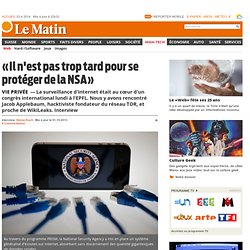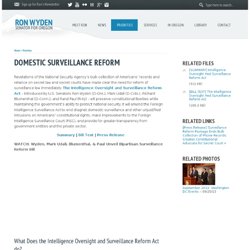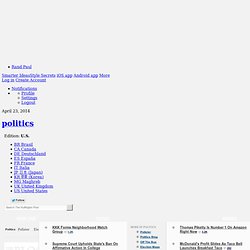

Anti-NSA Pranksters Planted Tape Recorders Across New York and Published Your Conversations. A woman at a gym tells her friend she pays rent higher than $2,000 a month.

An ex-Microsoft employee describes his work as an artist to a woman he’s interviewing to be his assistant—he makes paintings and body casts, as well as something to do with infrared light that’s hard to discern from his foreign accent. Another man describes his gay lover’s unusual sexual fetish, which involves engaging in fake fistfights, “like we were doing a scene from Batman Returns.”
These conversations—apparently real ones, whose participants had no knowledge an eavesdropper might be listening—were recorded and published by the NSA. Well, actually no, not the NSA, but an anonymous group of anti-NSA protestors claiming to be contractors of the intelligence agency and launching a new “pilot program” in New York City on its behalf. Click to Open Overlay Gallery “Eavesdropping on the population has revealed many saying ‘I’m not doing anything wrong so who cares if the NSA tracks what I say and do?’
Vie privée: «Il n'est pas trop tard pour se protéger de la NSA» - News High-Tech: Web. Vie privée La surveillance d'internet était au cœur d'un congrès international lundi à l'EPFL.

Nous y avons rencontré Jacob Applebaum, hacktiviste fondateur du réseau TOR, et proche de WikiLeaks. Interview Au travers du programme PRISM, la National Security Agency a mis en place un système généralisé d'écoutes sur internet, absorbant sans discernement des quantité gigantesques de données privées.Image: archive/Reuters Articles en relation. SUR LE NET - La Toile française réagit aux révélations sur la surveillance de la NSA. À Washington, des manifestants demandent de "débrancher Big Brother" - ESPIONNAGE - NSA.
Stop Watching Us: The Video. Espionnage: Snowden soutenu par une majorité d'Américains, de Britanniques et de Canadiens, selon un sondage. Selon un nouveau sondage international, une majorité de Canadiens et Britanniques auraient une opinion favorable d'Edward Snowden, mais pour les Américains, leur compatriote serait soit un héros soit un traître.

Ce sondage effectué par Angus Reid Global conclut que le Canada est le plus grand partisan de l'ancien agent de la NSA, avec 67% d'opinions favorables, suivi par le Royaume-Uni (60%). L'opinion publique américaine est plus divisée: 51% des participants l'érigent en héros, tandis que les 49% restants en font un traître. L'opinion est aussi partagée entre jeunes et vieux, une majorité des Américains âgés de moins de 35 ans défendant Edward Snowden tandis que les plus de 55 ans le condamnent. Un problème venu de nulle part «Il est évident qu'il est devenu le catalyseur et la manifestation concrète d'un problème qui paraît normalement abstrait et vague», déclare Angus Reid, président de Angus Reid Public Opinion.
«Ce problème est intéressant parce qu'il vient de nulle part. In new bill, four senators attack NSA’s bulk data collection. Edward Snowden's revelations about widespread surveillance by the US National Security Agency (NSA) started producing real political blowback in July, with a bill that almost defunded the NSA.

Now, a group of reformist politicians is taking a more careful aim at stopping the agency's controversial practices. Senators Richard Blumenthal (D-CT), Rand Paul (R-KY), Mark Udall (D-CO), and Ron Wyden (D-OR) have introduced a bill that would stop the NSA from collecting "bulk data"—like the database it has built of every American's phone calls. The bill, summarized here, amends two sections of the Foreign Intelligence Surveillance Act (FISA) to specifically ban bulk collection of phone and electronic communications records, such as e-mail. The government will still be able to get records of someone suspected of terrorism or espionage, but it prevents National Security Letters (NSLs) from being used for bulk data collection and requires more disclosure about how NSLs are used. NSA Reform Bill Comes From Bipartisan Group Of Senators. A bipartisan group of senators announced a comprehensive surveillance reform bill on Wednesday, but their effort may encounter resistance from the powerful Intelligence Committee chairwoman, who steadfastly supports the National Security Agency.

The legislation "expresses our bipartisan view of what Congress must do to enact real, not cosmetic, intelligence reform," said Sen. Ron Wyden (D-Ore.), a member of the Intelligence Committee. "The disclosures over the last hundred days have caused a sea change in the way the public views the surveillance system. " Domestic Surveillance Reform. Revelations of the National Security Agency’s bulk collection of Americans’ records and reliance on secret law and secret courts have made clear the need for reform of surveillance law immediately.

The Intelligence Oversight and Surveillance Reform Act - introduced by U.S. Senators Ron Wyden (D-Ore.), Mark Udall (D-Colo.), Richard Blumenthal (D-Conn.), and Rand Paul (R-Ky) - will preserve constitutional liberties while maintaining the government’s ability to protect national security. Opt out of PRISM, the NSA's gobal data surveillance program - PRISM BREAK. Mise au point du 22/09/2013 du 22 septembre 2013, Mise au point : RTBF Vidéo. PRISM : des entreprises impliquées et des associations veulent interpeller les pays de l'ONU.
The NSA Surveillance Destroys Diplomacy and Democracy. The diplomatic casualties mount as a consequence of National Security Agency (NSA) spying.

On Tuesday, September 17, a summit-level meeting imploded because of the uncontrolled espionage of the NSA. Dilma Rousseff, the President of Brazil, cancelled a state visit to Washington, DC. By way of explanation, the Brazilian government referred to the fact that the NSA intercepted the communications of the president and her aides: "Given the proximity of the scheduled state visit to Washington - and in the absence of a timely investigation of the incident with corresponding explanations and the commitment to stop the interception activities - it is not convenient for the visit to occur on the date previously agreed.
" Ontario Privacy Watchdog Is Not Amused With The NSA (VIDEO) Ontario's privacy watchdog delivered a scathing indictment of the NSA's efforts to circumvent internet encryption standards.

Ann Cavoukian, Ontario's Information and Privacy Commissioner, released a YouTube video Friday after The New York Times, in collaboration with The Guardian and ProPublica, reported that the U.S. National Security Agency has successfully "circumvented or cracked much of the encryption, or digital scrambling, that guards global commerce and banking systems, protects sensitive data like trade secrets and medical records, and automatically secures the e-mails, Web searches, Internet chats and phone calls of Americans and others around the world.
" Cavoukian takes issue with governments devoting so many resources to getting around encryption. Cavoukian then argues that we need greater transparency and accountability regarding government surveillance. Des milliers de citoyens allemands montrent l’exemple en manifestant contre la surveillance de la NSA. The US government has betrayed the internet. We need to take it back. Government and industry have betrayed the internet, and us.

By subverting the internet at every level to make it a vast, multi-layered and robust surveillance platform, the NSA has undermined a fundamental social contract. The companies that build and manage our internet infrastructure, the companies that create and sell us our hardware and software, or the companies that host our data: we can no longer trust them to be ethical internet stewards.
This is not the internet the world needs, or the internet its creators envisioned. We need to take it back. And by we, I mean the engineering community. Yes, this is primarily a political problem, a policy matter that requires political intervention. But this is also an engineering problem, and there are several things engineers can – and should – do.
One, we should expose. Spy Files: New WikiLeaks docs expose secretive, unruly surveillance industry. Restore The Fourth Amendment. Stop Watching Us. On July 4th join the protest against NSA surveillance. Restore the Fourth.